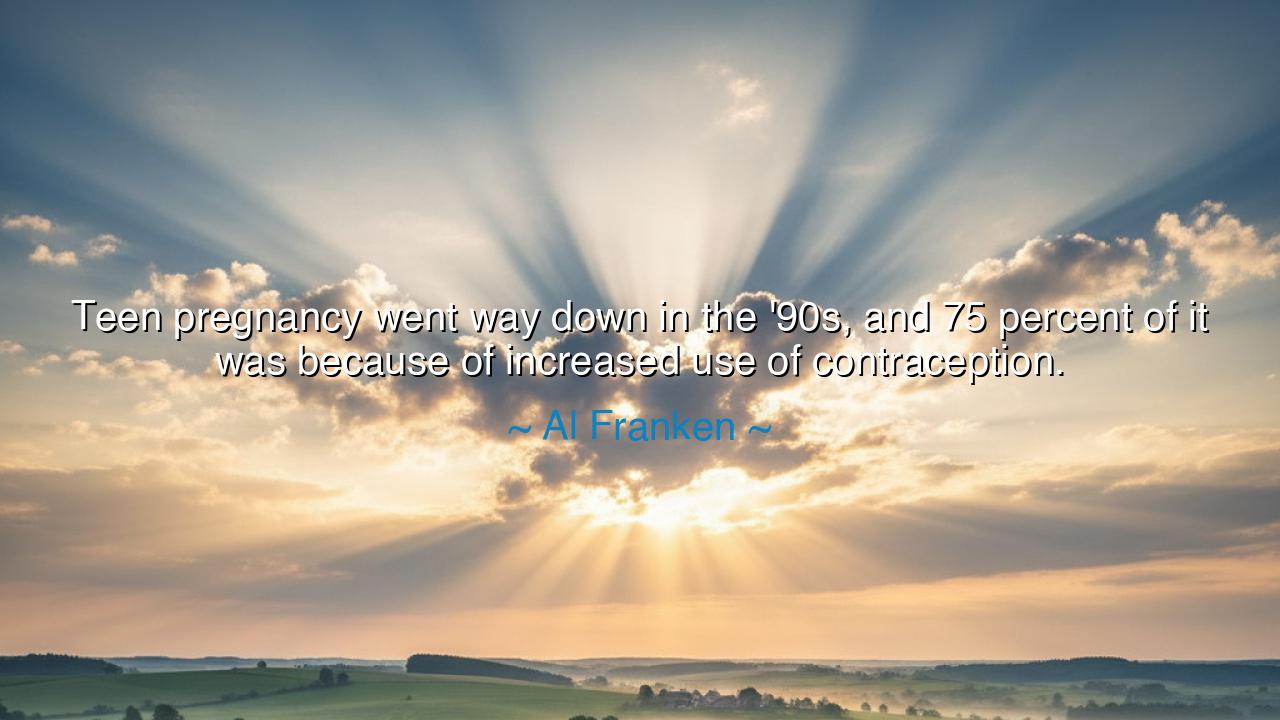
Teen pregnancy went way down in the '90s, and 75 percent of it
Teen pregnancy went way down in the '90s, and 75 percent of it was because of increased use of contraception.






Al Franken once spoke with clarity rooted in both data and concern: "Teen pregnancy went way down in the '90s, and 75 percent of it was because of increased use of contraception." In these words lies a lesson in cause and effect, in societal change guided by knowledge and action. Franken points to the profound influence of informed choice—the way access to tools and understanding can transform lives, reduce suffering, and shape the course of future generations. Teen pregnancy, once a perilous and common outcome, became less frequent not through admonition alone, but through practical empowerment.
The origin of this statement comes from Franken’s work as a public figure, writer, and political analyst who focused on social policy and public health. Observing the trends of the 1990s, he highlighted the measurable impact of increased availability and use of contraception among teenagers. This shift did not occur spontaneously; it was the result of education, advocacy, and the acknowledgment that young people needed both knowledge and resources to make responsible choices. His reflection underscores the power of society to shape outcomes when informed action is prioritized over judgment or moralizing.
History offers examples of similar interventions altering human destiny. In the early 20th century, the work of Margaret Sanger and other pioneers in family planning dramatically reduced unplanned pregnancies in the United States and Europe. By providing contraception and education, they gave women—not just teens—the ability to shape their lives and futures. Franken’s observation continues this lineage: practical tools, when made accessible, can prevent hardship, empower youth, and cultivate responsible adulthood.
The statement also illuminates the intersection of policy and personal choice. Teen pregnancy is not merely an individual issue—it is social, economic, and cultural. By making contraception available and teaching its proper use, society empowered individuals to make choices that had both personal and collective benefits. Franken’s words reveal that the decline in teen pregnancy was not accidental; it was the outcome of intentional, informed, and courageous action, and a testament to the potential of thoughtful policy to reshape lives.
Moreover, the quote emphasizes responsibility paired with opportunity. Access to contraception alone is insufficient without guidance, education, and support. Teenagers need not only the means to prevent pregnancy, but also the wisdom to understand consequences, and the encouragement to make prudent decisions. In the 1990s, the confluence of these factors—education, resources, and social awareness—created a measurable decline in teen pregnancy, demonstrating the profound power of knowledge when it meets opportunity.
The lesson for us is profound: knowledge is a tool of empowerment, not fear. To protect and guide youth, society must provide information, resources, and understanding, rather than relying solely on moralizing or coercion. Teenagers, given the right tools and counsel, are capable of making choices that safeguard their future, their health, and their dreams. Prevention and empowerment, not punishment, create lasting transformation.
Therefore, children of tomorrow, take Al Franken’s insight to heart. Recognize that when wisdom, opportunity, and guidance converge, lives are reshaped for the better. Advocate for education, access, and support, for these are the pillars that allow young people to thrive. Empowerment, knowledge, and choice are not merely privileges—they are instruments by which society cultivates a safer, healthier, and more hopeful future. Through these tools, we ensure that the promise of youth is not squandered, but nurtured into full and flourishing life.






AAdministratorAdministrator
Welcome, honored guests. Please leave a comment, we will respond soon